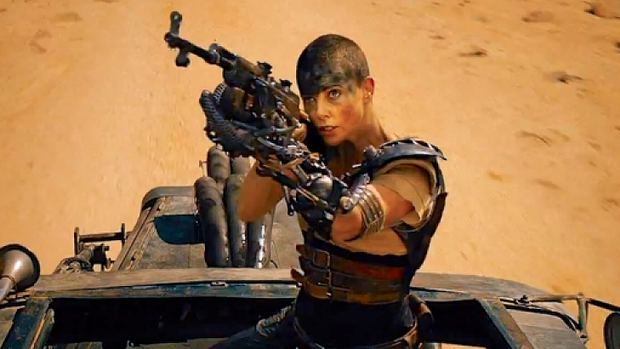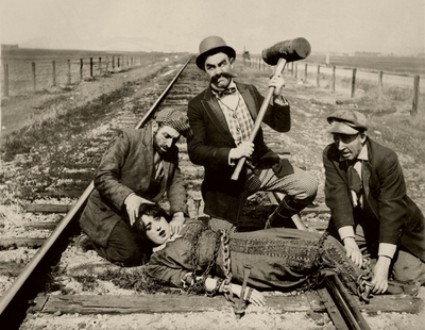Presumably because they already know why.
That is, of course, exactly my point: people intuitively understand that each gender is going to be disproportionately represented in some things. They've just decided (unconsciously, to my mind) that entertainment can't be one of those things, even though when you look at the nature of it there are several significant ways in which it's like other male-skewed activities.
Only because we don't live in a perfectly egalitarian world. Society is dominated by and self-reinforces sexism, racism, and other forms of segregation.
If entertainment is a guy thing then it's only because both men and women have accepted the idea that "entertainment is a guy thing".
Why that is can easily be attributed to centuries of cumulative effort insisting that "all women are this" and "all men are that".
These are just statements, though. They may be right, but what's the argument? I've made my reasoning pretty clear: performing for lots of people is exactly the kind of adrenaline-fueled, high-stakes affair that disproportionately attracts men in other walks of life. What's more, any pursuit of fame is essentially a zero-sum game where the overwhelming majority of participants don't get very far. Men have always been disproportionately attracted to these kinds of risks.
I'm also not suggesting that "entertainment is a guy thing." I'm simply disputing the idea that anything less than a 50/50 split in a given field is prima facie evidence of sexism, especially when that field has a lot of the characteristics that disproportionately attract men in other contexts.
This bothers me because you don't seem to acknowledge that the reason why this might be is that men have long been pressured into seeking "male influence" and are thereby discouraged from associating with "female influence".
Sure I do: I acknowledge it in my response to the nature/nurture question. I just don't come to the same conclusion re: its effect.
Something as simple as the term "mama's boy" has grossly more pejorative connotations that the equivalent "daddy's girl" despite practically identical meanings. It's a double standard.
Something is only a double standard if it applies different standards to things which ought to have the same standard. I don't accept the premise that the relationship a boy has with his mother is a mirror image of the relationship a girl has with her father. I don't think they can really be compared this way.
I'm happy to elaborate, but it'll almost certainly have to be in an entirely new discussion.
On the other side, why would women be able to empathize with either gender if not because they're rarely given the choice?
Because they don't have annoyingly high levels of testosterone, which are routinely shown to correlate with increased and amplified conflict.
I kind of hate giving this answer, because most people who talk about these things use these differences in biology to be really glib about complicated situations, and they downplay human agency a lot more than I'd like. So just know that this response is meant to be taken at face value, and not the start of some Red Pill diatribe.
I disagree and I think the fact that you limit your example to human cultures
Human cultures as opposed to...animal cultures? If so, guilty as charged: I'm talking about the differences between male and female humans. If someone asks me a question about male and female cicadas, I'll probably have a different response.
the vast majority of which have developed interdependently for ages, nullifies your evidence.
Saying cultural interdependency can reinforce some things is all well and good, but there's no way this works as a total explanation that "nullifies" all of observed human behavior, two at least two big reasons:
First, this is thousands of years, across
otherwise highly distinct cultures. Think about the argument here: even if we decided it was reasonable to think every society got its mores from a centuries-long game of cultural telephone, these are still places that
weren't interdependent enough to worship the same number (or types) of God, or eat the same food, or dress similarly, or have the same political systems, or even share the same levels of technological progression...but they're still using makeup because it was someone else's idea?
Second, if the mere fact of there being
any cultural interdependency automatically nullified any observed human behavior, you wouldn't be left with anything: just one big, speculative counterfactual. All observed human behavior would be tainted, including yours and mine. So this isn't really a rebuttal to observed human behavior, specifically: it's more a scorched earth argument that leaves us unable to really say anything.
It's also worth pointing out that nurture can inform nature in time. If, say for extreme example, all women remained at home while men hunted, then men would eventually evolve in ways better suited to that role, reinforcing and incidentally rationalizing the segregation.
You say rationalizing, but wouldn't it be just as accurate to say this makes gender roles correct/natural? After all, we're not having a theoretical discussion about whether humanity, in its infancy, should have had gender roles. We're having a discussion about the humans of today (and the relatively recent past). So if this is true, this would definitively end the argument in favor of gender roles, because it acknowledges that they're now a part of who we are on a biological level.
There's plenty, but the more realistically you portray life, the less distinguishable from life it becomes, at which point: why watch a movie?
Exactly. I almost said something like this. Came close to quoting the semi-fictional Robert McKee from
Adaptation. Movies are supposed to capture truths about life, but not just depict it. There's no point in that. Even when films go out of their way to depict the duldrums of everyday living, they're not really just depicting it: they're showing you it to make a larger point outside of it that just happens to be best illustrated by depicting it.






